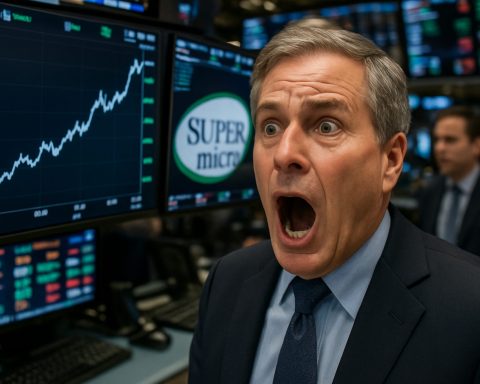- Tesla’s stock experienced a dramatic plunge, losing over 15% in a single day, marking its worst performance since September 2020.
- Elon Musk’s net worth saw a significant decline of $18 billion, triggered by a cut in Tesla’s delivery forecast by UBS.
- This downturn highlights the challenges of intertwining commercial success with political engagements, particularly Musk’s interactions with former President Trump.
- Tesla’s stock has fallen more than 51% from its peak in December, reflecting growing resistance and risks associated with Musk’s political and public endeavors.
- Instances of vandalism and arson at Tesla venues indicate the rising discontent surrounding Musk’s ventures.
- Musk continues to demonstrate resilience and a focus on innovation despite the financial and political turbulence.
- The situation underscores the volatile intersection of politics, economics, and technology in today’s entrepreneurship landscape.
A seismic shift is rippling through the corridors of Wall Street as Tesla’s stocks plunge dramatically, unraveling one of the most intense chapters yet in Elon Musk’s storied journey. In the unforgiving theater of high finance, the audacious CEO known for his unbridled ambition faced a dizzying drop in net worth—an eye-watering $18 billion in just a single day. This whirlwind of financial upheaval was sparked by UBS’s sharp cut in its delivery forecast for Tesla’s first quarter, leaving investors grappling with the aftermath.
As the markets closed, Tesla had marked its worst day since September 2020, with stocks dipping over 15%. This downturn peeled back a layer of invincibility around Musk, exposing the volatile dance between his political dealings and the relentless gears of commerce. While Wall Street speculated on his ties with former President Donald Trump possibly smoothing regulatory hurdles, it seems his bullish stance has become a double-edged sword, particularly with Musk’s increasingly fiery online presence.
Tesla’s stock, having plummeted more than 51% from its dizzying heights in December, stands as a testament to the perils of intertwining commercial agendas with political gambles. The pervasive discontent is felt not just on trading floors but also in whispers echoing from U.S. to European venues, where the Tesla brand—once a standard-bearer of innovation—is now overshadowed by political shadows. Troubling incidences, from vandalism to arson, at its venues across states like Colorado, underscore a growing resistance, a churn at the heart of Musk’s empire.
Amidst this turmoil, X, a crown jewel in Musk’s tech portfolio, was broadsided by severe outages, exacerbating the investor angst. The chaos underscored the fragility of even the most fortified networks when stretched across developing political and economic landscapes.
Yet, true to form, Musk stands resilient. Despite the cacophony of falling stocks and the murmurs of doubt, his calculative gaze remains on the horizon, embodying the electric pulse of innovation that refuses to be dimmed.
For the casual observer and astute investor alike, Elon Musk’s recent tribulations serve as a pertinent reminder of the delicate equilibrium in modern entrepreneurship: the fine line between strategy and spectacle. As shares rise and fall, the broader narrative reveals a simple truth—the confluence of politics, economics, and innovation is a formidable arena, where fortunes can soar as quickly as they crash.
Tesla’s Stock Plummet: What Investors Need to Know Amid Market Turbulence
The Tesla Stock Turmoil: Unraveling the Facts
The dramatic plunge in Tesla’s stock prices has sparked intense discussions in financial circles. As we digest this significant development, it’s essential to delve deeper into the nuances surrounding this situation, beyond the initial revelations.
Tesla, under Elon Musk’s ambitious leadership, has been a symbol of innovation and market disruption. Yet, the company’s recent stock freefall, shedding over 15% in a single day and over 51% since its peak in December, reflects broader issues at play.
Understanding the Factors Behind the Plunge
1. UBS Delivery Forecast Cut: UBS’s reduction in Tesla’s delivery forecasts was a pivotal trigger for the stock’s dramatic fall. This decision came amid concerns about slowing electric vehicle demand and increased competition in the sector.
2. Political Entanglements: Musk’s political affiliations and outspoken online presence have stirred controversy, potentially affecting investor confidence. His support for controversial figures and positions can be seen as a double-edged sword, offering both influence and risk.
3. Market Volatility: The broader economic climate, marked by inflationary pressures, interest rate hikes, and global supply chain disruptions, has contributed to the volatility impacting Tesla and similar tech companies.
Key Investor Questions and Insights
– Is Tesla still a good investment?
Despite current challenges, Tesla remains a leader in the electric vehicle industry with ambitious plans for future growth. Investors should consider both short-term volatility and long-term potential. Balancing risk and reward is crucial.
– How do Musk’s ventures impact Tesla’s performance?
Musk’s involvement in multiple companies, including SpaceX and X (formerly Twitter), often creates distractions. His divided focus can influence investor perceptions and, indirectly, Tesla’s stock performance.
– What does this mean for the EV industry?
Tesla’s struggles highlight competitive pressures in the EV market. Companies like Rivian, Lucid Motors, and traditional automakers entering the EV space add layers of complexity to Tesla’s growth trajectory.
Additional Facts and Context
– Technological Advancements and Challenges: Tesla continues to push boundaries with battery innovations and self-driving technology. However, controversies around safety and regulatory hurdles remain significant barriers.
– Global Market Trends: The global shift towards sustainable energy provides tailwinds for Tesla’s growth but also invites challenges from emerging markets where infrastructure is still developing.
– Controversies & Limitations: Tesla has faced issues regarding labor practices, vehicle reliability, and environmental concerns related to battery production. These remain areas to watch for investors concerned with ESG (Environmental, Social, and Governance) factors.
Recommendations and Quick Tips for Investors
– Diversify Investments: Consider balancing Tesla with stable, dividend-yielding stocks to mitigate risk amidst volatility.
– Stay Informed: Regularly review financial reports and expert analyses to stay up-to-date on market trends affecting Tesla and the broader automotive industry.
– Assess Long-term Vision: Evaluate Tesla’s potential based on its long-term strategic initiatives, such as energy solutions and global expansion efforts.
– Consider Economic Indicators: Monitor macroeconomic factors like interest rates and consumer sentiment that heavily influence automotive sales.
For more insights into the evolving financial landscape, visit Tesla’s Official Website for the latest updates and Tesla’s strategic vision.
As the situation unfolds, staying informed, assessing risk tolerance, and understanding the evolving dynamics will be crucial for making educated decisions in the current market environment.









